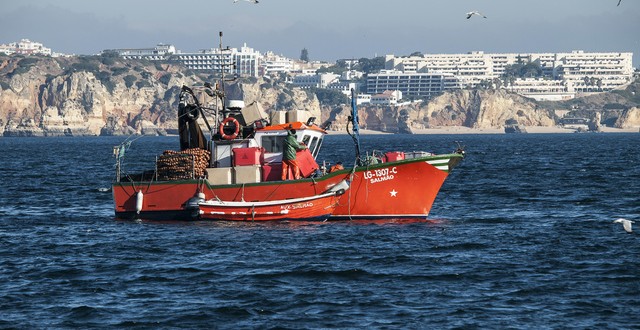People who are addicted to drugs are mostly in a bad way. They actually need some therapy to get off the poison. But not every addict takes the decision to detox and then have therapy: not with heroin, nor with alcohol and even less so with smoking, whatever it is that is being smoked. Many people maintain their dependencies and live well, or so they say.
It’s similar in our economy. It has settled into dependency. Our economy is addicted to subsidies, especially in one business sector. In tourism, all the poison is injected by Brussels and Lisbon. This time, even the IMF says that Portugal is too dependent on the service sector, it produces too little itself, can’t feed itself any more, has to import too much, doesn’t export enough itself, has an inflated and inefficient administration. Should there be another financial crisis in the near future – for example in the energy sector – with the possibility of increasing prices for aviation fuel, an EU eco-tax on air travel and its emissions, or another volcano eruption on Iceland – Portugal’s tourism could collapse. The experts haven’t even considered an earthquake on our own doorstep.
What would happen if, tomorrow, significantly fewer tourists entered the country through Portugal’s airports and even emptier hotels, apartments and restaurants had even more unused living space to offer? More than two million unemployed people would be standing at the counters of the employment offices to apply for subsidies themselves: unemployment benefit.
The concept of resilience was born of necessity and has not yet arrived in Portugal
The concept of resilience was born of necessity and has not yet arrived in Portugal. It refers to the tolerance of, or better, the ability of a system to withstand disturbances. How do I deal with changes in a familiar situation? With this in mind, we might at least consider the question about what would actually happen in Portugal tomorrow if all the subsidies for our tourism projects dried up; if the building of hotels was no longer supported, not least because there are already enough of them spoiling the unrestricted view of the sea. Just imagine if no more tourism projects were supported, and perhaps no major industrial agriculture and forestry projects (pig and poultry rearing, eucalyptus forests etc.).
How would a country develop, if the distribution of cash were fundamentally rethought and regulated anew? As a matter of principle, only sustainable projects in the fields of education and technology, health, private and public housing, energy efficiency in buildings, organic agriculture, and renewable energy production would be given preferential treatment, and only on a local level through regional funding organizations, for example through the funding office of the lowest decision-makers in the municipal council.
Aside from the fact that, during the last 25 years of Portugal’s membership of the EU, only the wrong projects have been funded with the wrong resources, Portugal and its economy have manoeuvred themselves into a cul-de-sac, which it is difficult to get out of. But how might we imagine what regional, sustainable funding would look like? What would the alternatives be?
Let’s imagine a small municipality. There would be many of these in Portugal, a total of 308 municipalities to be precise. In a rural area such as Monchique, 75% of whose 397 square kilometres consist of industrial eucalyptus forest, the risks of forest fires and soil erosion could be reduced hugely through a policy of great caution and prudence, whereby a town council would, with great care and limited funds, support local products such as olives, chestnuts, cork, cherries, carob, apples, potatoes, mushrooms etc. in a sustainable manner. If every small farmer was supported with just €0.10 for every kilo of his products, with a budget of less than a million euros a year, it would be possible for at least 10,000 tonnes of local produce to be harvested and processed: into olive oil, into carob flour, into insulating material for construction etc. The heart of such a policy would be self-sufficiency first and foremost, and, over and above that, the concept of resilience.
It can be seen from an English community by the name of Totnes how a village can achieve this. Once deeply in debt, but equipped with the political will and the motivation to pursue traditional and ecological agriculture and modern, efficient energy production in line with renewable principles, Totnes embarked around 2006 on an irreversible process to create a better life for its inhabitants. As early as 1982, in his world best seller “The Turning Point”, the American philosopher Fritjof Capra described the approaching paradigm shift of the new century. A change would come about, he argued, which would allow the mechanical world view of a Descartes of the 16th century to lead to a new, holistic, ecological world view.
At present, we anxiously observe the impoverishment of our cities (Portimão etc.), to which increasing number of people flee from land left fallow behind them. The manual and agricultural skills they needed to feed themselves atrophied visibly, accompanied by excessive debt. In future, we will increasingly be forced to confront the unexpected appropriately, and manage it together and in solidarity: extreme weather, as well as Alzheimer’s and Ebola, water shortage, hunger, unemployment and millions of refugees from uninhabitable regions, and a possibly serious recession in tourism.
We will only be able to survive economically and ecologically and to lead good lives if we become vigilant and learn to understand sustainability and focus our daily lives on that. José Garrancho, João Gonçalves and Hugo Lopes have been searching for answers, which you can read about on the following pages.
 Eco123 Revista da Economia e Ecologia
Eco123 Revista da Economia e Ecologia


